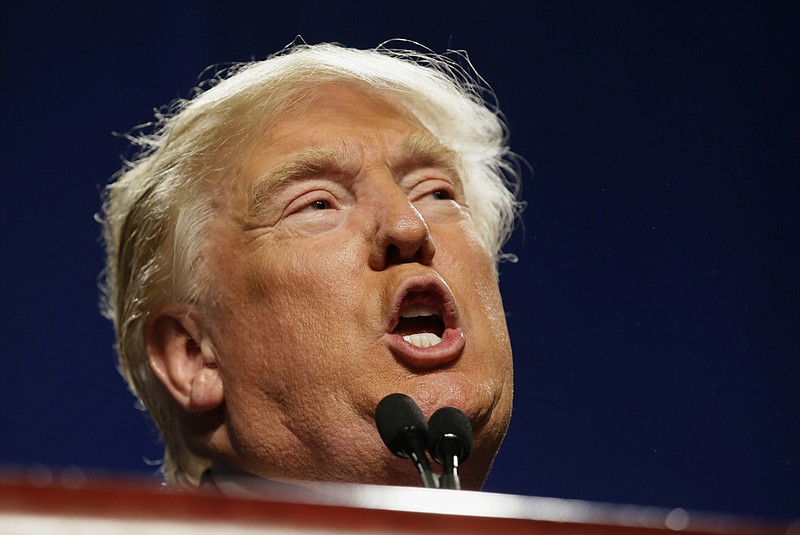Businessman Donald Trump claimed 94 of 95 counties in winning Tennessee in Tuesday's Republican presidential preference primary, so implying his victory was anything but thorough would be incorrect.
He exceeded 45 percent of the vote in essentially a five-person race - though 14 names were on the ballot - in 58 counties. He topped 50 percent of the vote in 26 counties, and he bettered 55 percent of the vote in six counties.
However, it may be instructive if Trump goes on to win the Republican nomination to see from where in the Volunteer State his strongest support came.
In general, the counties in which he received more than 50 percent of the vote are rural, heavily white and largely poor.
The counties also are isolated. Of the 26 which gave him more than half its votes, 13, or half, lie snug along Tennessee's borders with Georgia, Alabama, Missouri, Kentucky and North Carolina.
A glance at the six counties which gave Trump 55 or more percent of their votes:
* Clay County, in central Tennessee along the Kentucky border, gave him his highest percentage (57.14 percent). The county is 96.5 percent white, has 24 percent of its residents in poverty and has a median household income 33.2 percent below the median household income ($44,621) in the state.
* Grundy County, in central Tennessee on the Cumberland Plateau, gave Trump 55.85 percent of the vote. The county is 97.4 percent white, is the second poorest county in the state, has 26.1 percent of its residents in poverty (third highest in the state) and has a median household income 39.3 percent below the median household income in the state.
* Lake County, in far northwestern Tennessee along the Mississippi River, gave him 56.21 percent of the vote. The county is 69.4 percent white, is the third poorest county in the state, has 41.9 percent of its residents in poverty (highest in the state) and has a median household income 34 percent below the median household income in the state.
* Macon County, in central Tennessee along the Kentucky border, gave Trump 57.06 percent of the vote. The county is 96.7 percent white, has 19.3 percent of its residents in poverty and has a median household income 33.4 percent below the median household income in the state.
* Perry County, in rural central Tennessee along the Tennessee River, gave him 55.08 percent of the vote. The county is 94.6 percent white, is the 12th poorest county in the state, has 23.6 percent of its residents in poverty and has a median income 28.8 percent below the median household income in the state.
* Van Buren County, in central Tennessee on the Cumberland Plateau, gave Trump 55.02 percent of the vote. The county is 97.7 percent white, has 20.6 percent of its residents in poverty and has a median household income 23.2 percent below the median household income in the state.
The counties where he fared worst were urban areas or bedroom counties of urban areas. Counties where he received his smallest support were Bradley (Cleveland), Davidson (Nashville), Hamilton (Chattanooga), Knox (Knoxville), Madison (Jackson), Rutherford (Murfreesboro), Shelby (Memphis, his state low of 29.93 percent), Washington (Johnson City and Kingsport) and Williamson (outside Nashville).
Three of the counties (Campbell, Polk and Union) among the 26 that gave Trump 50 percent of its votes lie in the 3rd Congressional District, which is represented by U.S. Rep. Chuck Fleischmann.
"I think the Super Tuesday results show that voters are frustrated with what they've seen from the Obama administration over the last seven years," he said in an email. "The president's failed policies have created the slowest economic recovery since the Great Depression, which means there have been fewer job opportunities for people across the country and in my district. Voters are focused on finding a candidate who understands that America needs solutions to get people back to work and grow our nation's economy."
Across the country, Trump's supporters have been identified in other ways. You may have heard they don't care much for illegal immigration.
You may not be surprised to know they support the traditional family (even if theirs isn't one), they identify as religious (but may not be), are less pro-life than many conservatives, are tired of political correctness, probably don't have a college degree and generally feel disconnected from their communities, the political process and the country.
Is that a coalition that can win in November? Trump thinks so, and the political punditry is ready to hand him the nomination.
Since Tennessee is a reliably Republican state, giving John McCain 56.9 percent of the vote in 2008 and Mitt Romney 59.5 percent of the vote in 2012, the Volunteer State may not be a good test case for Tuesday's winner. But a close look at four of the counties in which he won more than 50 percent of the vote offers a tiny hint about what may be to come.
The four counties, Grundy, Houston, Humphreys and Lake, ran behind the rest of the state in their support for Romney in 2012. But they were ahead of the state in last week's primary, indicating, perhaps, that Trump is just their kind of candidate.
If that is replicated across the country, especially in areas where poor, rural, white folks make up the bulk of the electorate, the Trump campaign may be heartened about its chances in the fall.
